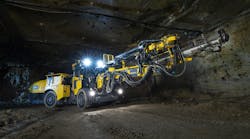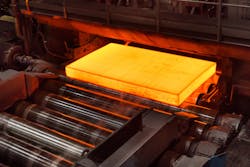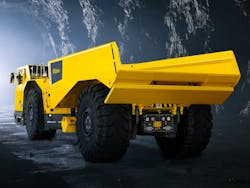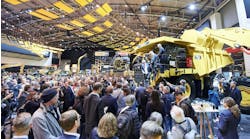Manufacturers Researching More Sustainable Component Production Process
Mining equipment manufacturer Epiroc is collaborating with steel manufacturer SSAB to research the potential of using fossil-free steel for the production of spare parts and components using additive manufacturing (aka 3D printing). The goal is to make the manufacture of components more sustainable while also offering potential design and performance improvements.
In 2016, SSAB launched its initiative for the creation of fossil-free steel. After several years of development, in 2021 the company's joint venture for this initiative, HYBRIT, produced what was considered to be the world's first fossil-free steel. Instead of using coal and coke in the steel production process, fossil-free hydrogen is utilized, as well as fossil-free energy in all aspects of the value chain, which eliminates carbon dioxide (CO2) emissions — and thus creating a more sustainable manufacturing process for steel.
The use of additive manufacturing (AM) itself can provide sustainability benefits as well as it can reduce the amount of material needed to produce a part. Often there is less machining required with parts made using AM, reducing energy consumption and again benefitting sustainability efforts.
AM Improves Hydraulic Component Design
The companies have begun their research with a hydraulic block typically used on Epiroc's mining rock drills. To start, they 3D printed a prototype of the hydraulic block using conventional steel powder.
According to Epiroc, traditional manufacturing of the hydraulic block uses milling and drilling which leads to the block needing to be plugged and sealed after production to prevent leaks. However, by producing the part with AM, six potential leak points were completely eliminated. This helps to reduce the amount of extra work that would otherwise be necessary to add the plugs and seals as well as minimizes hydraulic oil leaks which could harm the environment.
Using AM to produce the hydraulic block also offers the potential to improve the flow of hydraulic oil through the block because there are no longer any sharp edges which could impede flow as there often are with traditional manufacturing practices.
Another benefit the companies found AM offers is the ability to reduce the weight of the hydraulic block. Epiroc said in its press release announcing the collaboration with SSAB that a steel block weighing approximately 50 kg is typically used when traditional manufacturing processes are employed. But the optimized component design for AM required only a 7.5 kg block of steel, reducing the amount of material required by 85%.
The end product created using AM weighed just 6.6 kg, a weight reduction of 55% said Epiroc. Hydraulic blocks produced using traditional manufacturing processes typically weigh 15 kg.
READ MORE: Additive Manufacturing Brings Opportunities to Improve Component Design and Production
This weight reduction benefits not only the manufacturing process but has the potential to also benefit the machine in which the hydraulic block will be utilized. Epiroc explained in its press release that rock drills are positioned far out on the feed of the drill rig and therefore weight can have a substantial impact on the machine. But use of new technologies such as 3D printing could enable the creation of stronger components without negatively impacting the balance of the machine, the company said. It also noted reducing weight on the machine's feed could help to improve the lifecycle of other components as it would lead to less stress and load being placed on them.
Now that a successful prototype has been created using AM, the companies will next evaluate the potential of using fossil-free steel powder.
"Production and shipping of spare parts are interesting areas for us to explore going forward. There is a lot of potential in many ways, we can decrease lead times, increase availability, cut-cost on transportation and most important of all – reduce our environmental footprint," said Anders Flodman, Engineering Manager at Epiroc, in the company's press release.
Fossil-Free Steel Will Aid Emissions Reduction Goals
Since its fossil-free steel, known as SSAB Fossil-free, became available, SSAB has worked with Epiroc and other heavy equipment OEMs such as Volvo Construction Equipment to incorporate the steel into their machine designs.
In April 2022, Epiroc announced it would work with SSAB to use the fossil-free steel for a prototype of its battery-electric Minetruck MT42, and increase use of the steel over time. Doing so is in line with the OEM's sustainability goals.
"Sustainability is integrated in everything we do, and we are committed to halving our CO2 emissions by 2030. This exciting partnership with SSAB will support us and our customers on the journey to reach our very ambitious climate goals," said Helena Hedblom, Epiroc’s President and CEO, in the company's press release announcing its first use of the SSAB steel. "It is clear that our innovation agenda goes hand-in-hand with our customers’ sustainability agenda."
For its prototype of the underground mine truck, Epiroc used the fossil-free steel for the truck's dump box. According to the company, this lead to a 10-tonne reduction in CO2 emissions per manufactured dump box.
"The development of new technologies is essential to enable the transition to a low-carbon economy," said Johnny Sjöström, head of SSAB Special Steels, in the Epiroc's press release announcing the production of its first mine truck with the fossil-free steel. "Our fossil-free steel immediately reduces the carbon footprint to near zero without compromising the high quality and properties you would expect from SSAB steels. It is the same steel, just without the negative environmental impact."
READ MORE: Better Steels Make Better Cylinders
Earlier this year the companies announced a further expansion of their partnership. Epiroc signed a supply agreement with SSAB to use the steel manufacturer's recycled steel which is produced using sustainable energy sources explained Epiroc in its press release announcing the agreement. Known as SSAB Zero, the steel is made from recycled steel using fossil-free electricity and renewable natural gas, removing carbon emissions from the production process. Epiroc noted the quality of the recycled steel is equal to that of other steel's used in its mining equipment.
The recycled steel will be used in Epiroc's Smart and Green series of battery-electric mine trucks and loaders. Epiroc plans to use both SSAB Zero and SSAB Fossil-free in future machine designs to help achieve its emissions reduction goals.




